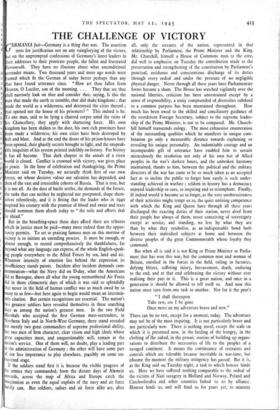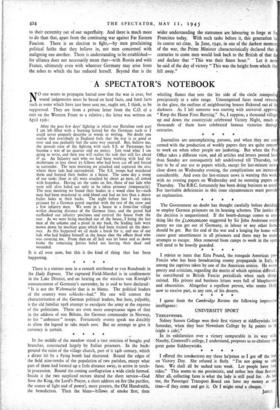THE CHALLENGE OF VICTORY
ERMANIA fuit—Germany is a thing that was. The assertion rests for justification not on any vainglorying of the victors, ut on the unprompted confessions of Germany's latest leaders in eir addresses to their prostrate people, the fallen and frustrated errenvolk. They have no illusions about what unconditional urrender means. Two thousand'years and more ago words were tamed which fit the German of today better perhaps than any at have found utterance since. " How art thou fallen from eaven, 0 Lucifer, son of the morning. . . . They that see thee hall narrowly look on thee and consider thee, saying, Is this the an that made the earth to tremble, that did shake kingdoms ; that de the world as a wilderness, and destroyed the cities thereof ; at opened not the house of his prisoners? " This indeed is he.
o one man, said to be lying a charred corpse amid the ruins of is Chancellery, they apply with shattering force. His own ingdom has been shaken to the dust, his own rich provinces have een made a wilderness, his own cities have been destroyed by olt and blast. And at the end the doors of his prison-houses have en opened, their ghastly secrets brought to light, and the unspeak- ble iniquities of his system printed indelibly on history. For history t has all become. That dark chapter in the annals of a riven orld is closed. Conflict is crowned with victory, war gives place o peace. In the hour of celebration and thanksgiving, the Prime nister said on Tuesday, we naturally think first of our own orces, on whose decisive valour our salvation has depended, and en of the vast and irresistible cohorts of Russia. That is true, but is not all. As the dust of battle settles, the demands of the future, e tasks that can neither be neglected nor postponed, shape them- elves relentlessly, and it is fitting that the leader who in 1940 nspired his country with the promise of blood and sweat and tears hould summon them afresh today to " the toils and efforts that ie ahead."
But in the breathing-space these days afford there are tributes hich in justice must be paid—many more indeed than the oppor- tunity permits. To set to praising famous men on this morrow of victory is to initiate an unending process. It must be enough, or almost enough, to record comprehensively the thankfulness, far beyond what any language can express, of the whole English-speak- ing people everywhere to the Allied Forces by sea, land and air. Whatever intensity of emotion lies behind the expression its insufficiency stands patent. Incident after incident demands com- memoration—what the Navy did on D-day, what the Americans did at Bastogne, above all what the young outnumbered Air Force did in those climacteric days of which it was said so splendidly that never in the field of human conflict was so much owed by so many to so few—but here again to begin would mean an intermin- able citation. But certain recognitions are essential. The nation's two greatest soldiers have revealed themselves in these searching days as among the nation's greatest men. In the two Field arshals who accepted the first German mass-surrenders, in Northern Italy and in North-West Germany, there stand revealed not merely two, great commanders of supreme professional ability, but two men of firm character, clear vision and high ideals whose great capacities must, and unquestionably will, remain at the nation's service. One of them will, no doubt, play a leading part in the administration of Germany ; the other will have some part of not less importance to play elsewhere, possibly on some un- zpected stage.
If the soldiers stand first it is because the visible progress of e arinies they commanded, from the distant days of Alamein awards, across the map of Africa and Europe catch the imagination as even the equal exploits of the navy and air force hardly can. But soldiers, sailors and air force alike are, after all, only the servants of the nation, represented in that relationship by Parliament, the Prime Minister and the King. Mr. Churchill, himself a House of Commons man to the core, did well to emphasise on Tuesday the contribution made to the preservation and strengthening of the constitution by Parliament's punctual, assiduous and conscientious discharge of its duties through every ordeal and under the pressure of no negligible physical danger. Never through all these years have Parliamentary forms become a sham. The House has watched vigilantly over the national liberties, criticism has been unrestrained except by a sense of responsibility, a unity compounded of diversities subdued to a common purpose has been maintained throughout. How much has been owed to the skilled and conciliatory guidance of the overdriven Foreign Secretary, subject to the supreme leader- ship of the Prime Minister, is not to be computed. Mr. Church- hill himself transcends eulogy. The most exhaustive enumeration of the outstanding qualities which he manifests in unique com- bination go only a measurable distance towards explaining or revealing his unique personality. An indomitable courage and an incomparable gift of utterance have enabled him to sustain miraculously the resolution not only of his own but of Allied peoples in the war's darkest hours, and the unbroken harmony maintained, thanks to him, between the political and the military directors of the war has come to be so much taken as an accepted fact as to incline the public to forget how rarely is such under- standing achieved in warfare ; seldom in history has a democracy enjoyed leadership so sure, so inspiring and so triumphant. Finally, ill indeed would it become us to forget, as the very unobtrusiveness of their activities might tempt us to, the quiet untiring competence with which the King and Queen have through all these years discharged the exacting duties of their station, never aloof from their people but always of them, never conceiving of sovereignty except as service, and standing, no less by what they are than by what they symbolise, as an indispensable bond both between their individual subjects at home and between the diverse peoples of the great Commonwealth whose loyalty they command.
But when all is said it is not King or Prime Minister or Parlia- ment that has won this war, but the common man .and woman of Britain, enrolled in the forces in the field, toiling in factories, defying blitzes, suffering injury, bereavement, death, enduring to the end, and at that end celebrating the victory without ever realising their part in it. This is a great nation, and once in a generation- it should be allowed to tell itself so. And now this nation must turn from one task to another. Not for it the poet's " I shall thereupon Take rest, ere I be gone Once more on my adventure brave and new."
There can be no rest, except for a moment, today. The adventure may not be of the most inspiring. It is not particularly brave and not particularly new. There is nothing novel, except the scale on which it is presented now, in the feeding of the hungry, in the clothing oCthe naked, in the prosaic routine of building up organi- sations to distribute the necessaries of life to the peoples of a ravaged continent. It means the continuance of restraints and controls which are tolerable because inevitable in war-time, but irksome the moment the military stringency has passed. But it is, as the King said on Tuesday night, a task to which honour binds us. Here we have suffered nothing comparable to the ordeal of the victims of Nazi savagery in Holland and Norway, Poland and Czechoslovakia and other countries linked to us by alliance. Honour binds us, and will bind us for years yet, to minister' to their extremity out of our superfluity. And there is much more to do than that, apart from the continuing war against Far Eastern Fascism. There is an election to fight,—by men proclaiming political faiths that they believe in, not men concerned with maligning one another. There is understanding to be established— for alliance does not necessarily mean that—with Russia and with France, ultimately even with whatever Germany may arise from the ashes to which she has reduced herself. Beyond that is the wider understanding the statesmen are labouring to forge at S Francisco today. With such tasks before it, this generation h its course set clear. In June, 1940, in one of the darkest momen of the war, the Prime Minister characteristically declared that it centuries to come men would look back to the British of that day and declare that " This was their fmest hour." Let it net be said of the day of victory " This was the height from which the fell away." •























 Previous page
Previous page